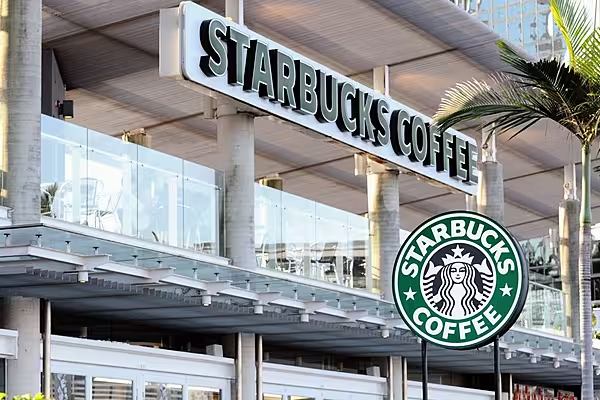Starbucks Corp., the world’s largest coffee-shop chain, reported third-quarter revenue that missed analysts’ estimates after same-store sales growth slowed in the Americas, its biggest region.
Sales rose 7.3 percent to $5.24 billion in the quarter ended June 26, the Seattle-based company said in a statement on Thursday. That trailed analysts’ $5.34 billion average estimate. Same-store sales climbed 4 percent in the Americas, decelerating from a 7 percent increase in the prior quarter. Analysts projected a 6.1 percent gain for the third quarter, according to Consensus Metrix.
While Starbucks has been adding locations and advertising new items, the chain is grappling with U.S. consumers who have been reluctant to spend. The University of Michigan’s preliminary sentiment index fell to a three-month low in July as the U.K.’s vote to leave the European Union flustered higher-income earners. Starbucks also revamped its domestic rewards program earlier this year, which confused some customers and may have driven them to other restaurants.
Multiple Messages
Starbucks also has suffered from dueling promotions. In the U.S., the chain’s annual Frappuccino Happy Hour special was partially overpowered by news about the updated rewards system, Chief Operating Officer Kevin Johnson said in an interview. The Happy Hour promotion also began later this year than it did last year.
While customers responded well to the loyalty program switch, “we had two major marketing messages” at the same time, he said.
The stock fell 3.3 percent to $55.70 in after-hours trading. Starbucks shares already had lost 4 percent this year through Thursday’s close, while the Standard & Poor’s 500 Index has increased 5.9 percent.
“Expectations are always high for this company,” said Jack Russo, an analyst at Edward Jones. “That is why the stock is a bit lower.”
Tempering Forecast
The company reiterated its forecast for annual profit, excluding certain items, saying it would be as much as $1.89 a share. That matches the average analyst estimate. But Starbucks pared back its expectations for same-store sales. They are now forecast to rise in the mid-single digits, compared with “somewhat above” that level in its earlier prediction.
Starbucks expects U.S. comparable-store sales to improve in the fourth quarter, compared with last quarter’s results, executives said on a conference call.
Cold-brew coffee, iced teas and breakfast sandwiches are helping pull in more customers, Johnson said.
In Starbucks’ Europe, Middle East and Africa division, same-store sales fell 1 percent. The results may have been hurt by turmoil in Europe leading up to the vote for the U.K. to pull out of the European Union. The chain has about 870 locations in the U.K., where it sells ristretto espresso shots, fruit toast and sandwiches topped with Marmite.
“There’s a higher level of uncertainty from the consumer, not only in Europe, but probably it’s a global phenomenon,” Johnson said.
Comparable-store sales rose 3 percent in China and Asia Pacific, where Starbucks has about 6,100 locations and is rapidly expanding. Chief Executive Officer Howard Schultz has said China could be a bigger market for Starbucks than the U.S. in the long term.
The company also is growing in China by accepting mobile-phone payments and expanding its bottled-drink distribution. Same-store sales jumped 7 percent in the third quarter in the Asian nation.
News by Bloomberg, edited by ESM. To subscribe to ESM: The European Supermarket Magazine, click here.














